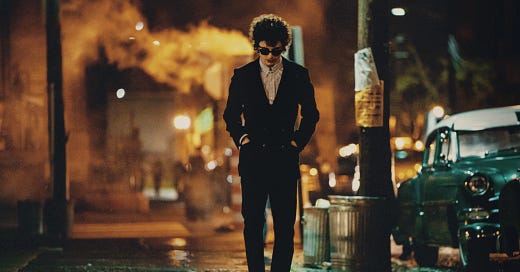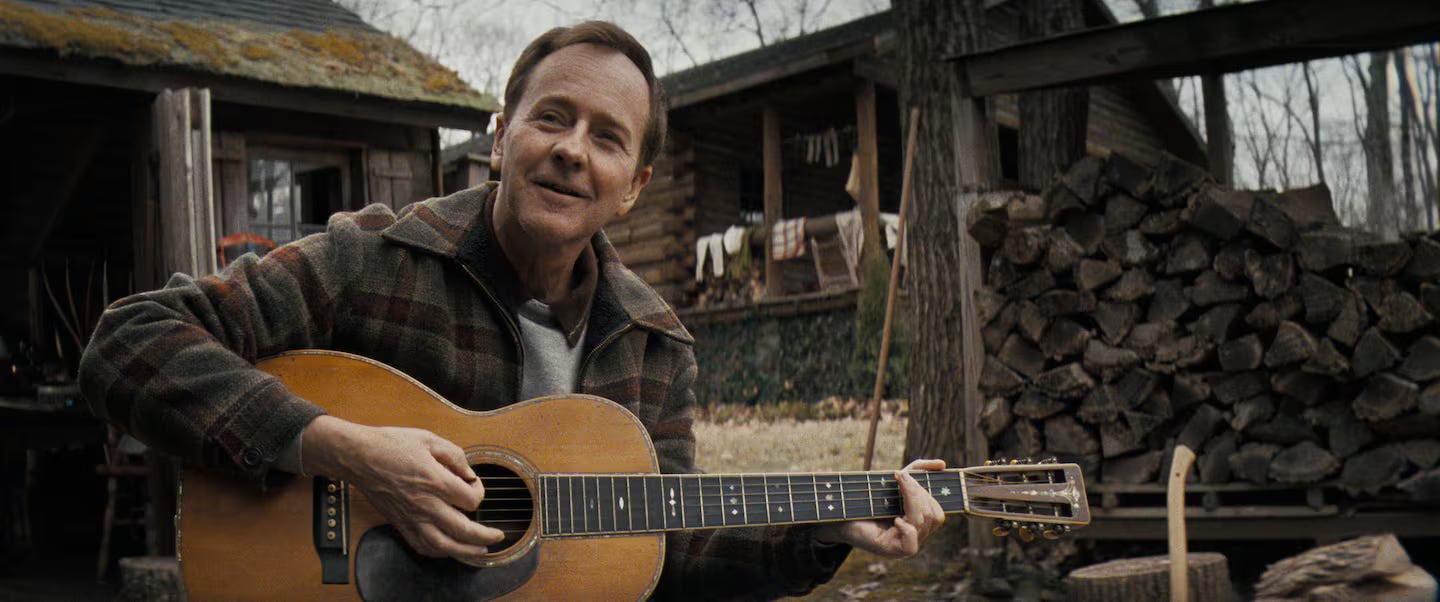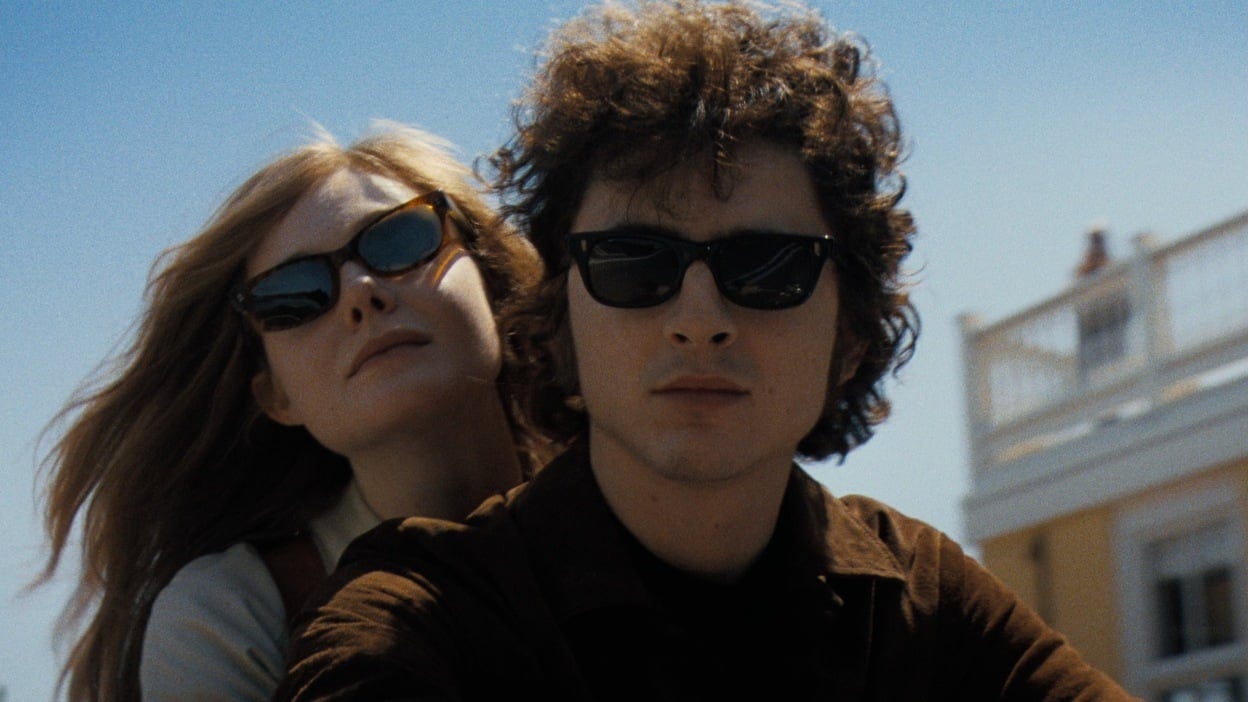It’s a complete unknown how this isn’t boring. Fresh off the disastrous fifth Indiana Jones, James Mangold returns with his traditionalist take on musical icon Bob Dylan, A Complete Unknown. This past Christmas, many praised Mangold’s take on the rockstar for bucking the typical cliches that have plagued the repetitive genre over the years. Collaborating with acclaimed Scorsese screenwriter Jay Cocks, Mangold helms this Bob Dylan film centered on his pivotal decision to go electric at the 1965 Newport Folk Festival. So, does A Complete Unknown transcend the Oscar bait? Or is it another in a long line of attempts to secure that elusive Golden Statuette?
What’s it all about?
A Complete Unknown begins with Bob Dylan (Timothee Chalamet) moving to New York City to meet his idol, recently hospitalized Woody Guthrie (Scoot McNairy). Finding him with fellow folk singer Pete Seeger (Edward Norton), the two ask for Dylan to perform a song. Impressed, Seeger invites Dylan to stay with his family, taking him under his wing. He shows him the New York City folk scene where he encounters fellow singer Joan Baez (Monica Barbaro) and independent artist Sylvie Russo (Elle Fanning). Dylan begins a relationship with the former who falls for his aloof nature but also finds frustration in her inability to connect with him. As his career kicks off, the social and political rest of the mid-60s inspire his socially conscious songwriting attracting the attention of Joan Baez. The two start a romantic affair and artistic collaboration. The rest of the film follows Dylan’s rise to stardom, his struggle to discover his artistic voice, and the gradual deterioration of his relationships.
Bucks Cliches
Director James Mangold and screenwriter Jay Cocks depict this volatile period in Dylan’s life in a series of vignettes. The musical biopic genre has grown stale, with one released each year to chase awards. It makes you wonder when they’ll run out of musicians to make movies about. The episodic nature gives way to little in terms of dramatic tension and high-wire stakes. Although, I doubt anyone expected to be on the edge of their seat, wondering if Dylan would go electric. I enjoyed this more subdued take on Dylan’s life that favors slice-of-life over theatrics.
That’s not to say the film doesn’t have some cliches. The film sprinkles in little Bob Dylan easter eggs for fans to clamor over and a bulk of the film concerns the toll of fame. Especially, given Dylan’s notorious “moodiness”, the concept of him not being able to withstand the fame was a major component. The film also features plenty of callbacks to various historical incidents from the mid-60s such as the racial riots, political assassinations, and the Cuban missile crisis. I mention this to show how the vignette-style structure diminishes the significance of some events, especially in terms of their influence on his songwriting. The film desperately desires to engage with the times. Yet, each event passes by in a glimpse, and the central character’s stoic acceptance of them presents this history feel like background fodder rather than a driving force in his artistic expression. On this particular point, the film often felt confused and didn’t gel with the film’s tone at times. It’s a sacrifice, however, that I didn’t mind.
Activism and the Artist’s Ego
Once Dylan reaches the height of his fame, he grows further withdrawn and distanced from those who built him into the artist he became. It’s a classic conundrum faced by every burgeoning artist but A Complete Unknown captures the angst and unknowability that come with it. After reaching a certain point of success where you can play music and eat comfortably, loftier desires simmer to the top. For Dylan, this unexplainable void manifests itself in the testy relationship he develops with himself and the audience, imagined or otherwise. We even see how this egoism spills into every relationship, distancing himself further from those who care about him. Mangold keeps all this very simple, instead of drawing out and building up these feelings, he crafts one simple scene where we see all the isolation and confusion arise as the weight of expectations bury him.
This again is where the strength of the episodes comes in, time isn’t wasted on excessive character development instead the audience is catching up to the characters’ newfound struggles and anxieties. This source of conflict lends itself well to the final sequence at the 1965 Newport Festival as he seeks to find his new artistic voice through rebellion. While I bemoan the lack of emphasis put on the real-world inspirations for Dylan’s songwriting, Mangold finds a way to explore the nature of changing tides: who’s in authority and how the liberators can become the oppressors. In a culture growing more disillusioned with the boomer culture that was inspired by Dylan’s work, they have slowly become the “institution” the younger generation rebels against. That’s the cyclical nature that A Complete Unknown subtly nails. In the film’s context, folk, and acoustic singers like Pete Seeger represent the activists from the Dust Bowl era singing songs that relate to nobody. While, the honchos at the Newport Festival gatekeep what folk music means, forbidding electric. Dylan’s decision becomes a threat and the tables turn. This may not be a dramatic fight but it’s emblematic of how culture changes over time.
Arrogance of a Wunderkind
As a non-Dylan expert who has no connection to his life or work, I couldn’t tell if his arrogance was intended or if we were meant to sympathize with his quest to destroy the traditions of a grassroots indie music festival. I always pity the rebel but there were times in the film when Dylan’s outright arrogance and sense of righteousness were too much. I found myself admiring the bootleg spirit of Pete Seeger. The film has a brilliant line about balancing a seesaw, with spoons of sand slowly filling the bucket—until Bob Dylan comes along with a shovel. I prefer the spoons, conceding that progress is slow. His actions felt downright villainous prioritizing his “artistic voice” over a foundation of tradition and community, steamrolling through everyone’s hard work. This led to the sense that Dylan’s entire persona is built on being a contrarian for the sake of it. Which is why the activism and topical moments never rang true to me. Maybe this is part of his ethos and I’m not with it, but it’s hard to sympathize with a moody wunderkind. Ironically, Chalamet proved to be an inspired casting choice, being a wunderkind in his own right—achieving remarkable success at a young age with the advantages of a well-connected upbringing.
Great performances!
I’ll be the first to admit that I never really cared for Timothee Chalamet. I just don’t like his general aura and don’t get his overall appeal. He’s not an everyman, he’s physically unappealing, and I’ve never seen him truly disappear into a role. Frankly, you just want to punch him (okay, I’m biased). But, he picks his scripts carefully and works with the very best. I have to give him his kudos this time. He found the role of his career, living and breathing the Bob Dylan character. The general tone of the film is to observe Dylan from a bit of a distance: the same distance Dylan puts others at. Thus, I don’t think there’s a clear stance taken one way or the other. A smart touch that Chalamet understands perfectly well, intentionally keeping himself at odds with his surroundings and the audience watching. My general detestation of the Chalamet persona made the film's more uncomfortable and unflattering moments resonate even more. A lot of credit should also go to hair and makeup who transform him into the spitting image of Bob Dylan.
But top to bottom, I thoroughly enjoyed the supporting performances. These performances anchor the film, and the cast's chemistry allows the audience to grasp the shifting dynamics of their relationships, allowing the episodic structure to feel seamless. Monica Barbaro shines as a musical icon grappling with artistic insecurity while clashing with Dylan’s ego even though you know she’s the one for him. Elle Fanning’s Sylvie Russo, the on-again-off-again girlfriend, falters as their emotional disconnect becomes unbearable. Meanwhile, Edward Norton’s heartfelt Pete Seeger adds humanity to a sea of malaise whose own place in the world becomes unstable. They all enhance the atmosphere and complete this tumultuous period in Dylan’s life.
Like a gust of wind
From a technical level, what’s not to like? I loved every production detail, especially the detailed sets that perfectly matched the vibe of Greenwich Village in the 1960s. The film cultivates such a specific texture as cinematographer Phedon Papamichael pours everything into each frame. Sequences where the characters perform are so immaculately constructed appearing downright heavenly as the spotlight glistens centerstage. Whether it’s the open-air charm of the Newport Festival or the grungy intimacy of Dylan’s apartment, every setting feels richly alive and evocative.
Mangold’s is one of those invisible directors you can’t quite define. There’s nothing to identify his films, either he’s hopping aboard large-scale blockbusters or Oscar bait. We don’t know much about what makes the man, but the camera is where it needs to be, there’s not a superfluous moment embracing a minimalist, classical style. He captures the soothing slice-of-life moments so effervescently as if you’re spending the day with the musical icon. Scenes feel like a passing gust of wind, cooling your face on a hot summer day. It’s a very restrained piece of work that answers the call of the script. It’s far more artistic and poetic than one would expect, especially during one special scene between Fanning and Chalamet towards the end.
I don’t have any stakes in this
I’m honestly not a fan of the genre nor care much about Bob Dylan’s life. This goes for most musicians. That’s just me. I’d rather watch biopics on politicians, painters, film people, or even athletes. I find their lives more pressing and interesting. I don’t subscribe to the fan culture surrounding most musicians, although if someone gave me a Kobe Bryant biopic, I’d be first in line. So for those out there who worship Dylan, this is surely the film to savor. Still, A Complete Unknown transcends mere fan fiction; Mangold and Cocks delve deeper, deconstructing the mythos of Dylan while delivering an engaging narrative. The film leaves behind unforgettable scenes and lines, reminding us there’s always more to uncover about the man behind the legend. So finally, is it an accurate depiction of the man’s life? I don’t know and I don’t care. Is it perfect? No. Did it entertain me? Yes.










All very well, but I'm on a lifetime boycott of musical biopics until they go away and stop bothering me.